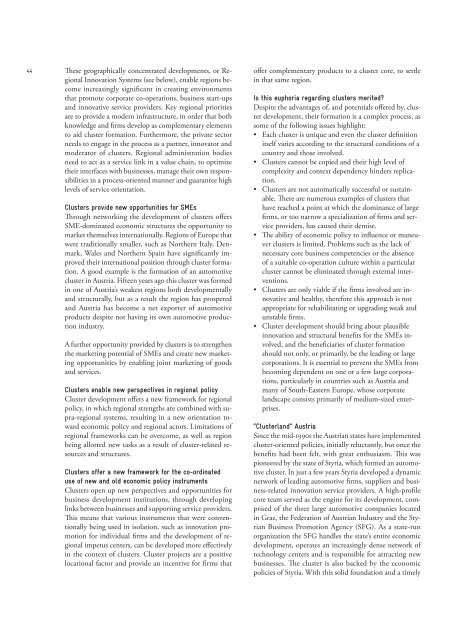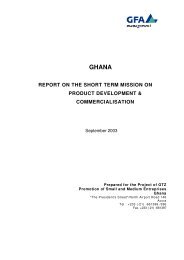Local/Regional Economic Development in South ... - Value Chains
Local/Regional Economic Development in South ... - Value Chains
Local/Regional Economic Development in South ... - Value Chains
Create successful ePaper yourself
Turn your PDF publications into a flip-book with our unique Google optimized e-Paper software.
These geographically concentrated developments, or <strong>Regional</strong><br />
Innovation Systems (see below), enable regions become<br />
<strong>in</strong>creas<strong>in</strong>gly significant <strong>in</strong> creat<strong>in</strong>g environments<br />
that promote corporate co-operations, bus<strong>in</strong>ess start-ups<br />
and <strong>in</strong>novative service providers. Key regional priorities<br />
are to provide a modern <strong>in</strong>frastructure, <strong>in</strong> order that both<br />
knowledge and firms develop as complementary elements<br />
to aid cluster formation. Furthermore, the private sector<br />
needs to engage <strong>in</strong> the process as a partner, <strong>in</strong>novator and<br />
moderator of clusters. <strong>Regional</strong> adm<strong>in</strong>istration bodies<br />
need to act as a service l<strong>in</strong>k <strong>in</strong> a value cha<strong>in</strong>, to optimize<br />
their <strong>in</strong>terfaces with bus<strong>in</strong>esses, manage their own responsibilities<br />
<strong>in</strong> a process-oriented manner and guarantee high<br />
levels of service orientation.<br />
Clusters provide new opportunities for SMEs<br />
Through network<strong>in</strong>g the development of clusters offers<br />
SME-dom<strong>in</strong>ated economic structures the opportunity to<br />
market themselves <strong>in</strong>ternationally. Regions of Europe that<br />
were traditionally smaller, such as Northern Italy, Denmark,<br />
Wales and Northern Spa<strong>in</strong> have significantly improved<br />
their <strong>in</strong>ternational position through cluster formation.<br />
A good example is the formation of an automotive<br />
cluster <strong>in</strong> Austria. Fifteen years ago this cluster was formed<br />
<strong>in</strong> one of Austria’s weakest regions both developmentally<br />
and structurally, but as a result the region has prospered<br />
and Austria has become a net exporter of automotive<br />
products despite not hav<strong>in</strong>g its own automotive production<br />
<strong>in</strong>dustry.<br />
A further opportunity provided by clusters is to strengthen<br />
the market<strong>in</strong>g potential of SMEs and create new market<strong>in</strong>g<br />
opportunities by enabl<strong>in</strong>g jo<strong>in</strong>t market<strong>in</strong>g of goods<br />
and services.<br />
Clusters enable new perspectives <strong>in</strong> regional policy<br />
Cluster development offers a new framework for regional<br />
policy, <strong>in</strong> which regional strengths are comb<strong>in</strong>ed with supra-regional<br />
systems, result<strong>in</strong>g <strong>in</strong> a new orientation toward<br />
economic policy and regional actors. Limitations of<br />
regional frameworks can be overcome, as well as region<br />
be<strong>in</strong>g allotted new tasks as a result of cluster-related resources<br />
and structures.<br />
Clusters offer a new framework for the co-ord<strong>in</strong>ated<br />
use of new and old economic policy <strong>in</strong>struments<br />
Clusters open up new perspectives and opportunities for<br />
bus<strong>in</strong>ess development <strong>in</strong>stitutions, through develop<strong>in</strong>g<br />
l<strong>in</strong>ks between bus<strong>in</strong>esses and support<strong>in</strong>g service providers.<br />
This means that various <strong>in</strong>struments that were conventionally<br />
be<strong>in</strong>g used <strong>in</strong> isolation, such as <strong>in</strong>novation promotion<br />
for <strong>in</strong>dividual firms and the development of regional<br />
impetus centers, can be developed more effectively<br />
<strong>in</strong> the context of clusters. Cluster projects are a positive<br />
locational factor and provide an <strong>in</strong>centive for firms that<br />
offer complementary products to a cluster core, to settle<br />
<strong>in</strong> that same region.<br />
Is this euphoria regard<strong>in</strong>g clusters merited?<br />
Despite the advantages of, and potentials offered by, cluster<br />
development, their formation is a complex process, as<br />
some of the follow<strong>in</strong>g issues highlight:<br />
• Each cluster is unique and even the cluster def<strong>in</strong>ition<br />
itself varies accord<strong>in</strong>g to the structural conditions of a<br />
country and those <strong>in</strong>volved.<br />
• Clusters cannot be copied and their high level of<br />
complexity and context dependency h<strong>in</strong>ders replication.<br />
• Clusters are not automatically successful or susta<strong>in</strong>able.<br />
There are numerous examples of clusters that<br />
have reached a po<strong>in</strong>t at which the dom<strong>in</strong>ance of large<br />
firms, or too narrow a specialization of firms and service<br />
providers, has caused their demise.<br />
• The ability of economic policy to <strong>in</strong>fluence or maneuver<br />
clusters is limited. Problems such as the lack of<br />
necessary core bus<strong>in</strong>ess competencies or the absence<br />
of a suitable co-operation culture with<strong>in</strong> a particular<br />
cluster cannot be elim<strong>in</strong>ated through external <strong>in</strong>terventions.<br />
• Clusters are only viable if the firms <strong>in</strong>volved are <strong>in</strong>novative<br />
and healthy, therefore this approach is not<br />
appropriate for rehabilitat<strong>in</strong>g or upgrad<strong>in</strong>g weak and<br />
unstable firms.<br />
•<br />
Cluster development should br<strong>in</strong>g about plausible<br />
<strong>in</strong>novation and structural benefits for the SMEs <strong>in</strong>volved,<br />
and the beneficiaries of cluster formation<br />
should not only, or primarily, be the lead<strong>in</strong>g or large<br />
corporations. It is essential to prevent the SMEs from<br />
becom<strong>in</strong>g dependent on one or a few large corporations,<br />
particularly <strong>in</strong> countries such as Austria and<br />
many of <strong>South</strong>-Eastern Europe, whose corporate<br />
landscape consists primarily of medium-sized enterprises.<br />
“Clusterland” Austria<br />
S<strong>in</strong>ce the mid-1990s the Austrian states have implemented<br />
cluster-oriented policies, <strong>in</strong>itially reluctantly, but once the<br />
benefits had been felt, with great enthusiasm. This was<br />
pioneered by the state of Styria, which formed an automotive<br />
cluster. In just a few years Styria developed a dynamic<br />
network of lead<strong>in</strong>g automotive firms, suppliers and bus<strong>in</strong>ess-related<br />
<strong>in</strong>novation service providers. A high-profile<br />
core team served as the eng<strong>in</strong>e for its development, comprised<br />
of the three large automotive companies located<br />
<strong>in</strong> Graz, the Federation of Austrian Industry and the Styrian<br />
Bus<strong>in</strong>ess Promotion Agency (SFG). As a state-run<br />
organization the SFG handles the state’s entire economic<br />
development, operates an <strong>in</strong>creas<strong>in</strong>gly dense network of<br />
technology centers and is responsible for attract<strong>in</strong>g new<br />
bus<strong>in</strong>esses. The cluster is also backed by the economic<br />
policies of Styria. With this solid foundation and a timely



